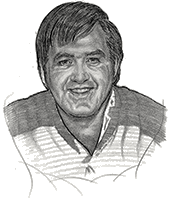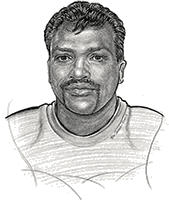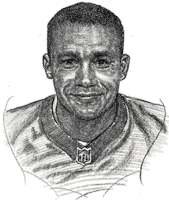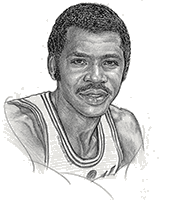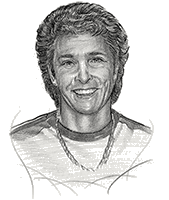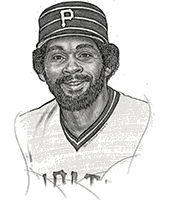Born and raised in a nickel mining town in northern Ontario, where you could play hockey outdoors form October until mid-April, Bob Whidden followed his heart and talents to the Toronto Maple Leafs organization in 1967 at age 21 after two years in the Ontario Junior League. After six minor league seasons, he signed with the Cleveland Crusaders of the World Hockey Association in 1972 as the backup to Hall of Fame ‘keeper Gerry Cheevers, and in 1973, the two shared the league’s lowest goals against average. In four seasons with the Crusaders, he averaged nearly 26 games per year, limiting opponents to less than 3.5 goals per game. Shortly after undergoing a second back surgery in the spring of 1976, he saw the Crusaders fold, and after a brief stint in the Indianapolis Pacers organization in 1977, he elected to retire and return to Cleveland, where he became a major figure in the city’s hockey circles. He played a key role in bringing the Lumberjacks franchise to the city, has run innumerable hockey clinics for youngsters, and coached at several amateur levels. He is best known for his success at St. Edward High School, where he became head coach in 1984 and has since taken the Eagles to the Final Four of the Ohio High School AAA Championships 15 times and won nine state titles. He and his wife Irma make their home in North Olmsted.
The persuasive conviction of a high school coach and the willingness of a college recruiter to take a gamble on a 6’3″ 185 lb linebacker paid handsome dividends for this East Cleveland native. Limited by an injury to only three football games as a senior at Shaw High, after playing in just seven varsity contests as an underclassman, he nevertheless found himself the recipient of a scholarship to West Virginia University. Good deal all around. In his sophomore year at WVU, he was All-East for the first of two seasons, and as a junior was getting All-American mention. After finishing his college career in 1982 as WVU’s career leader in assisted tackles and tackles for a loss, he was selected to nine All-American teams and became the school’s first consensus All-American in 27 years. Drafted by the Buffalo Bills in the second round of the 1983 draft (39th pick), he began an 11-year career which took him to Super Bowl appearances in 1990, 1991, 1992 and 1993, earned him selection to the 1990 and 1991 Pro Bowls and eventually to a place on the Bills’ Wall of Fame, the 20th player so honored. When he left the Bills in 1994, he took with him the honor of being Buffalo’s all-time leading tackler. He played for Atlanta in 1995 and Minnesota in 1996, then signed a contract with Buffalo in 1997 and retired—as a Bill. Darryl now makes his home in Orlando, Florida, where he runs a traffic control company.
Robert Smith was the best football player ever at Euclid High School—a two-time Mr. Ohio Football, Ohio’s Division 1 Back-of-the-Year in 1988 and 1989, gaining 5, 318 yards on 563 carries and scoring 71 touchdowns in three brilliant seasons. He led the Panthers to a 29-5 record, three Greater Cleveland Conference titles, and three trips to the state playoffs. As a result he was named not only a High School All-American as a senior, but the 1989 Gatorade Circle of Champions National High School Football Player of the Year and was also honored by the Washington TD Club as the Dial Soap High School Player of the Year. Taking his talents next to Ohio State, he shattered the revered Archie Griffin’s freshman rushing record, running for 1,126 yards in his first year. After leading the Buckeyes in rushing as a junior in 1992, he entered the NFL draft, where he became the first round (21st overall) pick of the Minnesota Vikings in 1993. Despite a series of injuries, he won recognition as one of the NFL’s best running backs over the ensuing eight seasons, rushing for a club record 6,818 yards and being named to the 1998 and 2000 Pro Bowls. His best season came in 2000 when he rushed for 1,521 yards to lead the NFC. It was the only season in which he was able to play in all 16 games of the campaign. But after undergoing his third knee surgery, he elected to retire from football at the age of 28. Now the co-owner of a software company with another Cleveland football standout Tom Cousineau, and owner of a construction company, he currently makes his home in Pembroke Pines, Florida.
At age 17, Tommy Salem had an athletic scholarship to Michigan State and a scholarship to the Cleveland Institute of Art in his pocket and was well along the path in his studies to become a concert violinist. The choice was obvious to the youngster from Bolivar Rd. in downtown Cleveland. With an amazing 126 bouts already under his belt as an amateur in the flyweight, bantamweight and featherweight divisions, he elected to become a professional boxer. By the time he turned 18 he was fighting some of the world’s best featherweights and had been featured as the world’s “Featherweight of the Month” by the National Boxing Association. Boxing in elimination bouts to become the next contender to face Sandy Saddler for the featherweight title, he ended Auburn Copeland’s undefeated string of 26 wins, to set up a match with Charley Riley, ranked No.3 in the world. Now 19, he lost a split decision, which prevented him from moving up in the rankings behind Saddler and Willie Pep. A draft call for the Korean War put his career on hold from 1951-53, after which he resumed competing in elimination bouts as a lightweight until he retired in 1958, with a record of 40 wins, including 11 knockouts, and eight losses. Two of those losses were disputed split decisions in New York City to highly rated Johnny Busso and future lightweight champion Carlos Ortiz. Ortiz was later quoted as saying his fight with the Cleveland contender was the toughest of his career. After putting away his gloves he attended college and pursued a career in advertising and sales. He and his wife Dorothy, a college professor, make their home in Independence.
Deceased 2015
A big man with a big heart and an unswerving dedication to the youthful athletes of Greater Cleveland, John Peyton’s passion was to “keep the kids on the playgrounds and off the streets.” Countless rec rooms and mantles in Northeastern Ohio homes are decorated with plaques, medals and trophies bearing testimony to his determination to develop awards programs for as many young athletes as possible in as many sports as possible. He offered time, support and guidance to a multitude of sports organizations: executive secretary for two high school leagues, the MAC and the NCL; board member of the CYO; CAVS Rebounders Club and the Parma Amateur Athletic Foundation; and supervisor of area baseball and softball tourneys for the OHSAA. Most visible was his work with two of the city’s highest profile sports groups: as Executive Secretary of the Cleveland Baseball Federation, he was indispensable in keeping it a bulwark for the city’s amateur baseball programs. And when, in his second term as president of the Cleveland Touchdown Club, an organization supporting all levels of football competition, the Browns flew off to Baltimore, he resolutely kept the Club afloat until the team was reborn. Before his heart stopped suddenly in October, 2000 at age 44, he would have pooh-poohed the added importance of those last two roles. For John Peyton, it was all about the games.
In an era when 6-6 high school basketball centers were considered premium “big men” East High School’s 6-8 Emanuel “Manny” Leaks was both giant and giant-killer. By the end of his senior season in 1963-64, he had earned a prominent place for himself on an impressive list of East High stars. His fierce rebounding and steady scoring provided the twin engines which propelled the Blue Bombers all the way to the finals of the ’64 Ohio AA (large schools) championship game and himself to All-Scholastic, All-Ohio and Parade Magazine All-American honors. En route to the state title game, East recorded its third win of the season over East Tech in the regional championship game, ending a string of six straight Scarab appearances in the state finals. The Blue Bombers then obliterated Elyria 58-31 in the state semi-final game before losing to Dayton Belmont in the final. Continuing his career at Niagara University, where he would be teamed in his final season with future immortal Calvin Murphy, he carved out a large place for himself in the Purple Eagles’ record book. Thirty six years after his final season in 1967-68, Leaks still ranks second on the school’s career rebounding list with 1087, holds three of its top 10 season rebounding marks, three of its single game rebounding highs, and is 18th on the career scoring leaders’ list with 1,243 points, an average of 17.3 per game. He went on to play six pro seasons with four different ABA teams and a pair of NBA clubs. His finest effort came in 1969-70 when he averaged 18.8 ppg and 12.5 rebounds for the Dallas Chaparrals in the ABA. Now a real estate investor, he resides in Cleveland.
One of the finest all-around female athletes ever to come out of Cleveland, Sue Koziol starred in basketball at Lincoln-West High and later at Cleveland State where she established a peach basket full of records and also managed to work in a school record javelin toss in track. When she elected to test the arm that enabled her at age 14 to set a Junior Olympics Softball Throw record of 232 feet in flag football, she quarterbacked her Hennie Homes team to seven national titles, winning seven Offensive MVP awards along the way. But it was as a softball shortstop that she rose to the heights of the extraordinary. Already a recognized star in the sport when she began playing for Cleveland State, she led the Vikings to the OAISW Regional Championships and a spot in the national tournament, earning first team All-American honors in 1982 while also garnering the first of her four awards as the team’s Most Outstanding Player. After her graduation in 1986 through 2001 she would win a total of 13 Women’s Class “A” All-World All-American awards while competing in the U.S. Slow Pitch Softball Association and ASA, and playing on six USSA national championship teams. She was selected the MVP of the USSA World Series in 1987, 1989 and 1992 and the MVP of the National Triple Crown Championship Tournament in 1992. Capping her career, she was chosen in 1993 for the USSSA’s All-Time All-World Team, one of just 12 players to be so honored. She is currently living in Cleveland and teaching and coaching at Lincoln West.
An early round selection of the Houston Astros in the 1969 amateur players draft after a stellar baseball career at Benedictine High, Mike Easler trod the border line of a major league career for 10 long years before finally locking down a big league berth with the Pittsburgh Pirates’ 1979 World Championship team as a pinch hitter. After hitting a career high .338 with 21 home runs in 1980, he found himself realizing a dream by playing before his family in the 1981 All-Star Game at Municipal Stadium. By the time he ended his playing career after the 1987 season he had established himself as one of the game’s most respected hitters with a .293 career average over 1,151 games played with six teams—the Astros, Angels, Pirates, Red Sox, Yankees and Phillies—over a 14 year span. Among his career highlights: hitting for the cycle as a Pirate in 1980 in a 10-6 win over the Reds; finishing in the American League’s Top 10 in hitting (.313), hits (188) and slugging percentage with the Red Sox in 1984; and notching an eighth inning single as a Yankee for the only hit off the Indians’ Tom Candiotti in a 1987 contest. He later served as batting coach for the Red Sox and Cardinals and at the time of his induction was with the Cincinnati Reds organization for which he has served in several managing and coaching positions both in the United States and Latin America. He makes his home in Las Vegas.
2001 Crocker Rd., Ste. 510, Westlake, OH 44145
Phone: 216-241-1919

